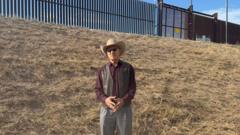With Trump's promises of sweeping immigration changes imminent, communities in Chicago and Texas exhibit starkly different reactions. Congregants in Chicago express fears of targeted raids and potential violence, while some Latino residents in Texas support stricter immigration measures. As preparations unfold, many organizations look to support vulnerable migrants amid a charged political atmosphere.
Communities Brace for Trump’s Immigration Policy Shifts

Communities Brace for Trump’s Immigration Policy Shifts
As Donald Trump prepares for his return to office, immigrant communities across the United States grapple with uncertainty and fear over potential mass deportations.
Amidst rising tensions surrounding immigration, communities far from the border are gearing up for what could be significant changes under Donald Trump's administration. In Chicago, members of the Lincoln United Methodist Church gathered to express their concerns over the incoming president's promise to initiate the largest expulsion of undocumented immigrants in U.S. history. Reverend Tanya Lozano-Washington, addressing about 60 congregants while distributing warm beverages, flagged January 20th as a pivotal day for immigrant families fearing the worst as Trump takes office.
The church, located in the predominantly Latino Pilsen neighborhood, has long served as an activist hub. However, it transitioned to offering online services out of fear of anti-immigrant retaliation and potential ICE raids. Parishioner David Cruseno, whose mother immigrated to the U.S. illegally, articulated a sentiment of persecution and injustice towards what many perceive as potential government overreach.
Meanwhile, over 1,400 miles away in the Rio Grande Valley, the mood among some local Latino communities diverges sharply. In contrast to the apprehensions in Illinois, residents like David Porras argue that immigration must occur through proper channels, suggesting support for Trump’s tougher stance. Local ranchers recount experiences with migrants seeking aid or shelter, providing them with context on the realities of living in a border town.
Hidalgo resident Demesio Guerrero further clarified that while he supports legal immigration processes, he believes it is essential to control who enters the U.S. He noted a shift in political sentiment in Starr County, which broke a 130-year trend by supporting Trump in the 2024 election, concurrent with broader Latino support for many Republican initiatives.
Despite ongoing debates over immigration policy, a recent proposal by the Texas State Government to allocate land for migrant detention facilities has ignited controversy, with critics arguing it perpetuates civil rights violations. Local leaders, however, perceive potential economic benefits in the long run.
As the country faces significant shifts in immigration policy, the situation remains fluid. Municipalities like Chicago continue to enforce sanctuary laws, even as pressures from Republican-led states push for stricter measures. Organizers in activist spaces are taking proactive steps, offering legal advice, developing communication applications for those in distress, and addressing fears around family separations.
Despite the rift in perspectives across states like Texas and Illinois, one sentiment prevails: migrant communities are deeply anxious as they confront the unknowns of a Trump's presidency, aware of historical patterns of deportation and the rise of anti-immigrant sentiment. In the face of uncertainty, both organizational support and community resilience are being mobilized to address the potential fallout of Trump's proposed policies.
The church, located in the predominantly Latino Pilsen neighborhood, has long served as an activist hub. However, it transitioned to offering online services out of fear of anti-immigrant retaliation and potential ICE raids. Parishioner David Cruseno, whose mother immigrated to the U.S. illegally, articulated a sentiment of persecution and injustice towards what many perceive as potential government overreach.
Meanwhile, over 1,400 miles away in the Rio Grande Valley, the mood among some local Latino communities diverges sharply. In contrast to the apprehensions in Illinois, residents like David Porras argue that immigration must occur through proper channels, suggesting support for Trump’s tougher stance. Local ranchers recount experiences with migrants seeking aid or shelter, providing them with context on the realities of living in a border town.
Hidalgo resident Demesio Guerrero further clarified that while he supports legal immigration processes, he believes it is essential to control who enters the U.S. He noted a shift in political sentiment in Starr County, which broke a 130-year trend by supporting Trump in the 2024 election, concurrent with broader Latino support for many Republican initiatives.
Despite ongoing debates over immigration policy, a recent proposal by the Texas State Government to allocate land for migrant detention facilities has ignited controversy, with critics arguing it perpetuates civil rights violations. Local leaders, however, perceive potential economic benefits in the long run.
As the country faces significant shifts in immigration policy, the situation remains fluid. Municipalities like Chicago continue to enforce sanctuary laws, even as pressures from Republican-led states push for stricter measures. Organizers in activist spaces are taking proactive steps, offering legal advice, developing communication applications for those in distress, and addressing fears around family separations.
Despite the rift in perspectives across states like Texas and Illinois, one sentiment prevails: migrant communities are deeply anxious as they confront the unknowns of a Trump's presidency, aware of historical patterns of deportation and the rise of anti-immigrant sentiment. In the face of uncertainty, both organizational support and community resilience are being mobilized to address the potential fallout of Trump's proposed policies.





















